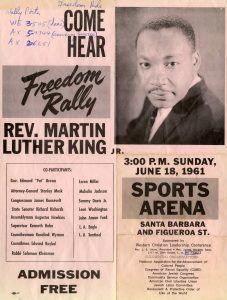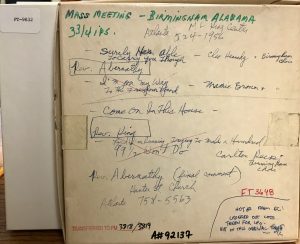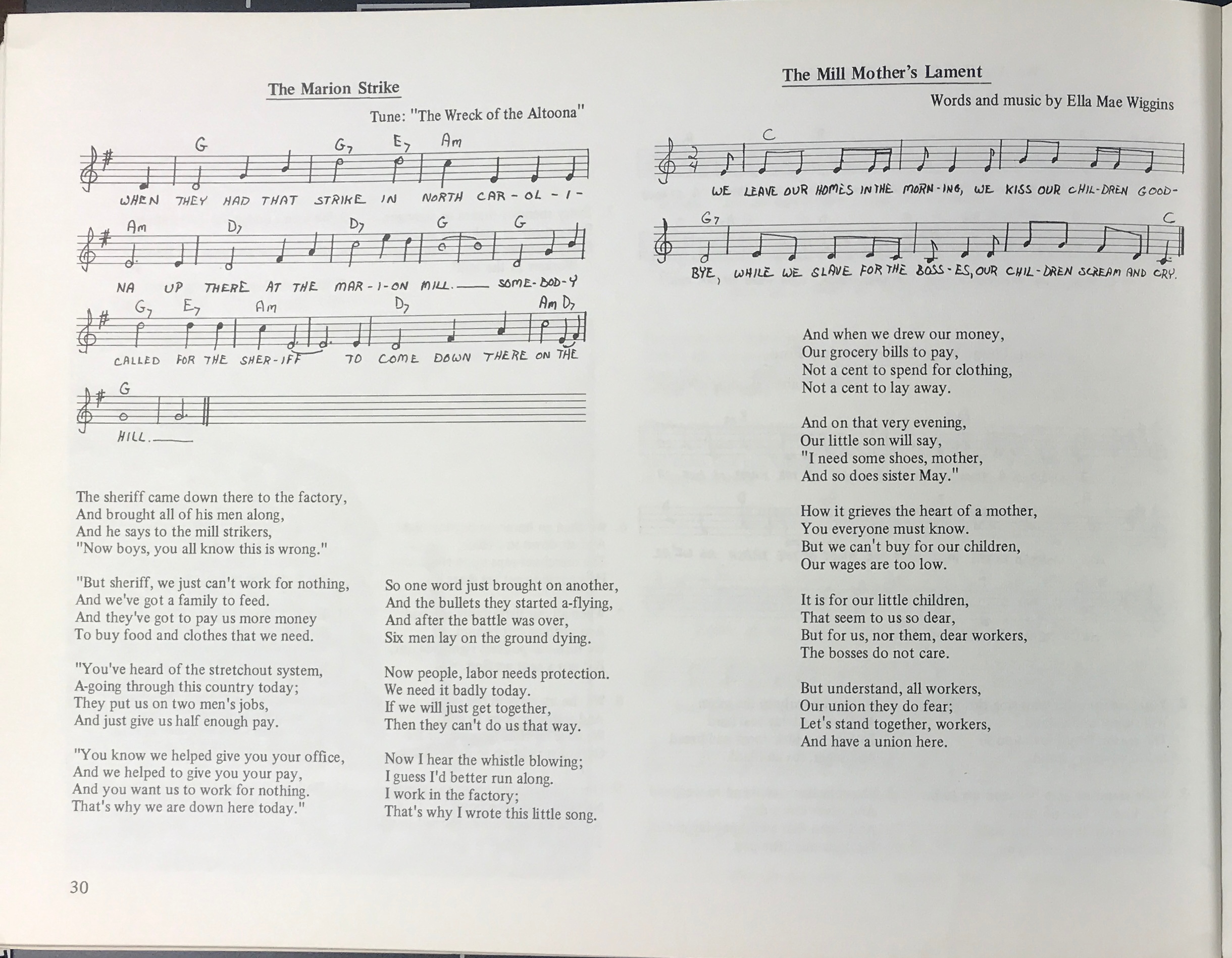
Today marks the 90th anniversary of the June 7th, 1929 violence at the Loray Mill Strike in Gastonia, North Carolina. The strike started in April of 1929 with the arrival of the National Textile Workers Union. The workers at the mill began striking for their demands. On June 7th sheriff’s deputies raided tents set up near the mill by striking workers. Violence ensued, and Police Chief Orville Aderholt was killed.
Just a few months after the culmination of the Loray Mill Strike, in September of 1929, Ella May Wiggins, a 29-year-old working mother and strike organizer, was killed by a mob of men trying to run the strikers out of town. The union was preparing for a large rally at which Ella May Wiggins would sing her ballads. On the way to the meeting, Ella May and other union members were attacked by anti-strikers. Ella May was one of many mill women and girls who protested the working conditions, hours and little pay in the Gaston County Mills in 1929. Often overlooked, the women working in the mills had a huge impact on the future of labor organizing in the South.
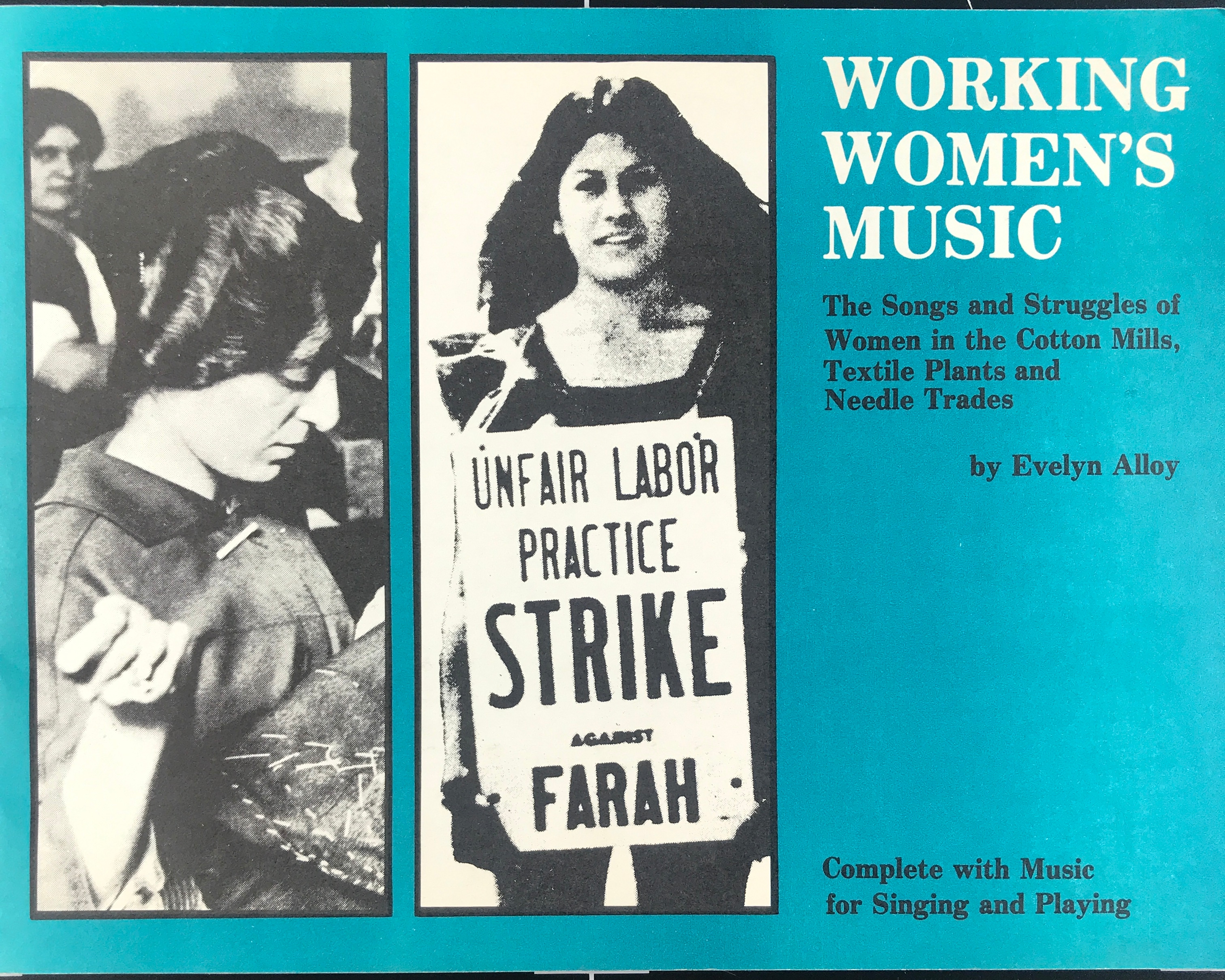
Ella May’s legacy lives on in the protest songs and ballads she wrote and sang. Her most popular protest song is “Mill Mother’s Lament,” a ballad covered by Pete Seeger on the album American Industrial Ballads.
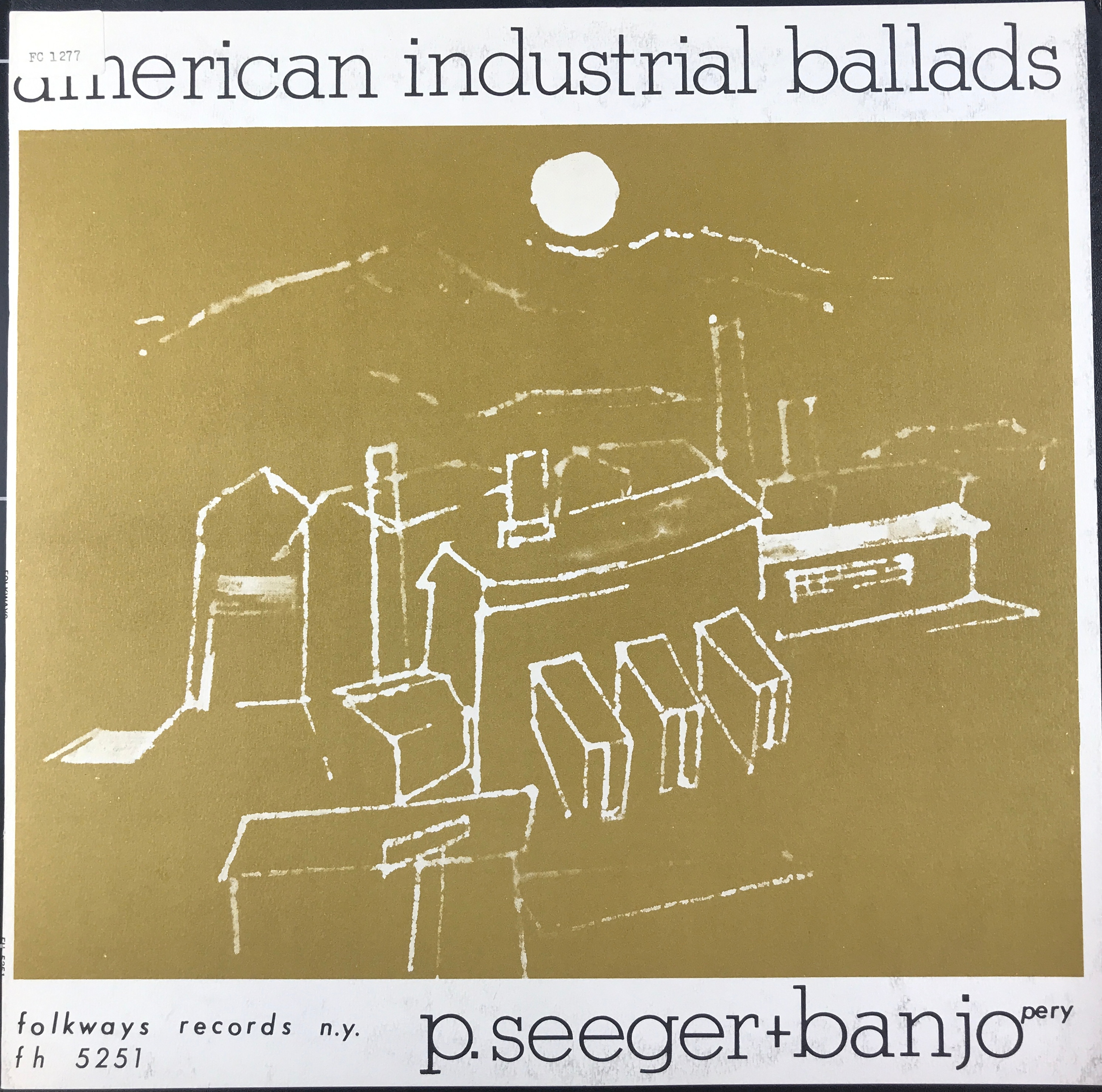
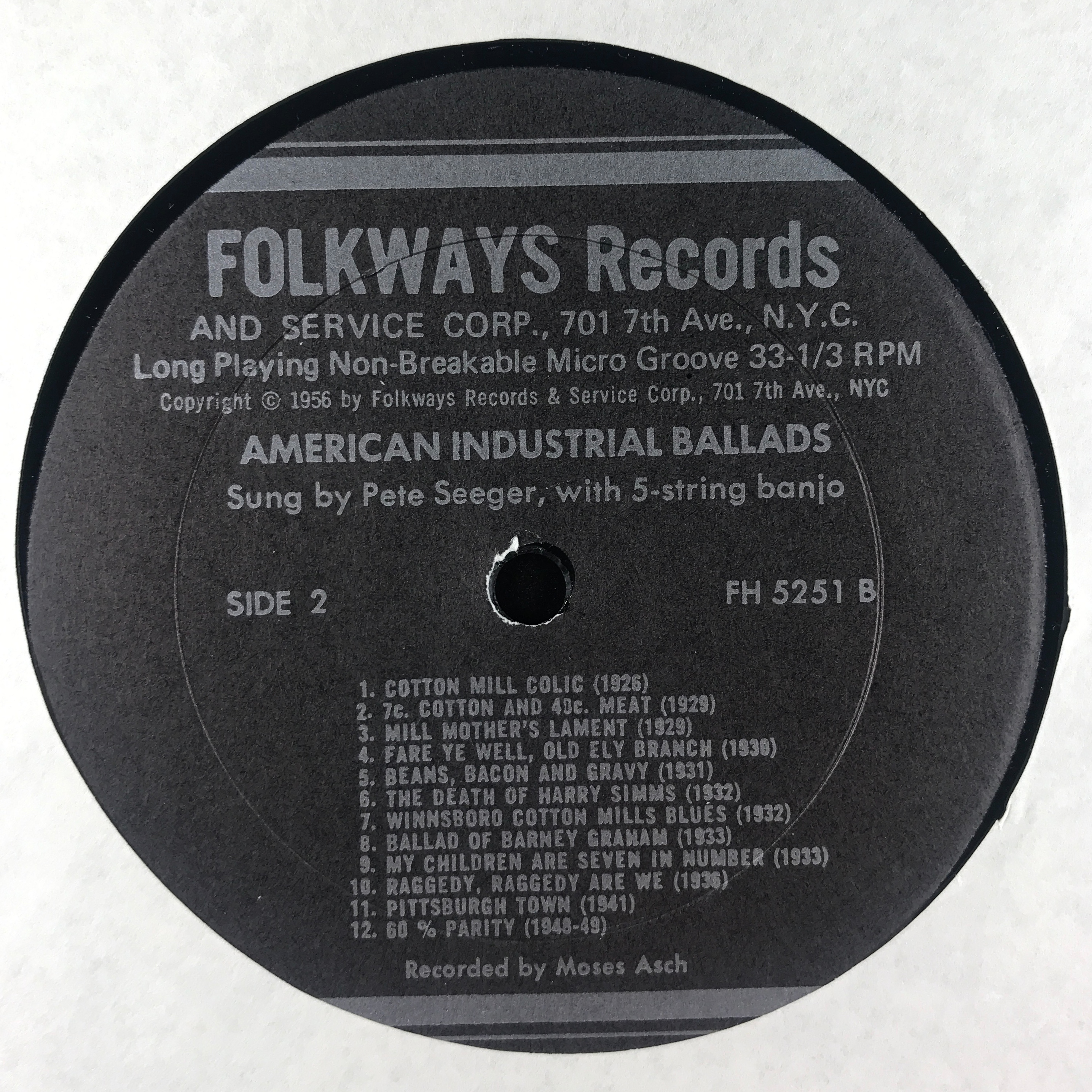
She also penned songs such as “The Big Fat Boss and the Worker” and “Up in Old Loray,” that were sung at union meetings and rallies. Some accounts say that Ella May did not write “Up in Old Loray,” but the lyrics in the Archie Green Collection have Ella May credited as the writer. Handwritten and typed copies of the lyrics to a few of her songs can be found in the Archie Green Papers.
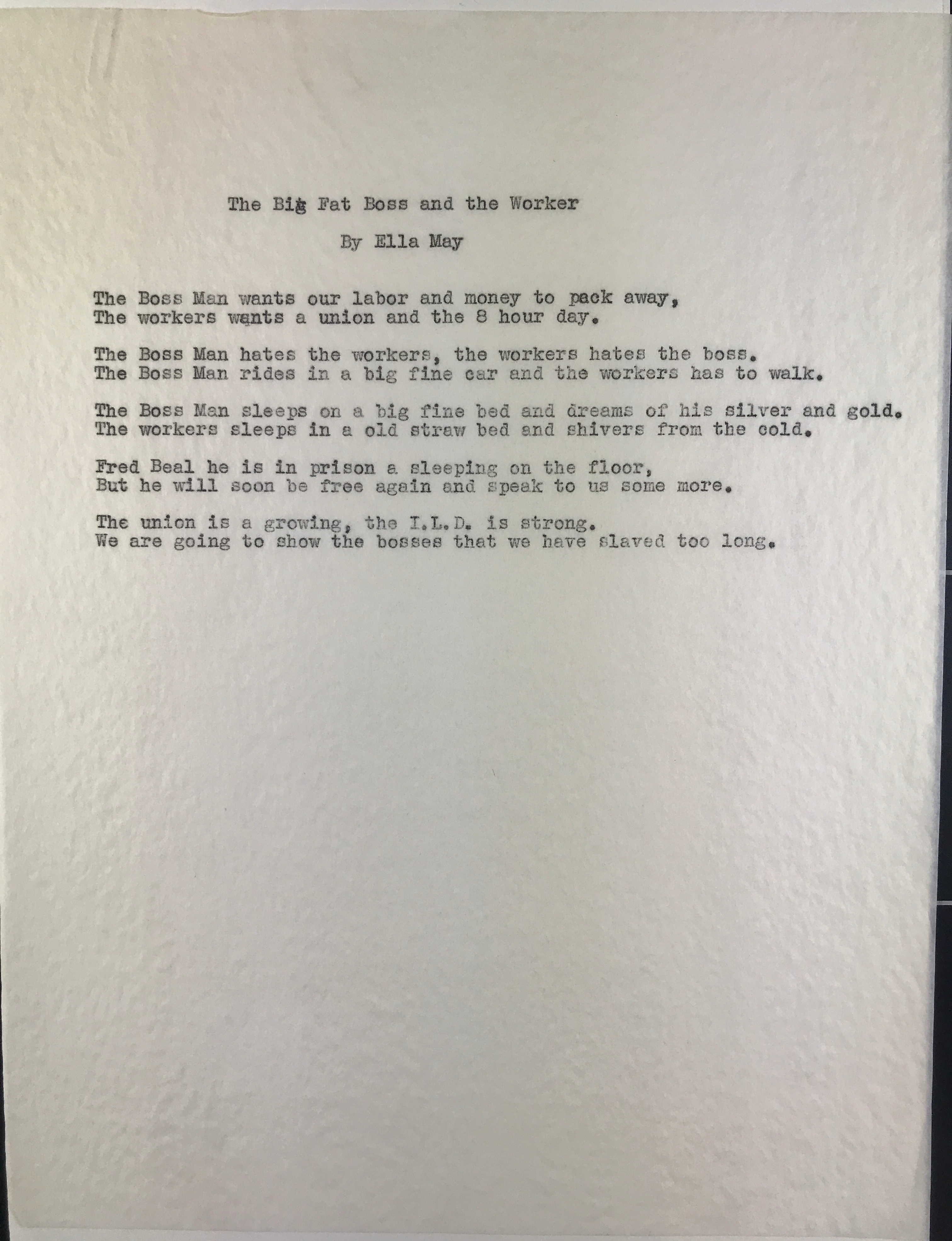
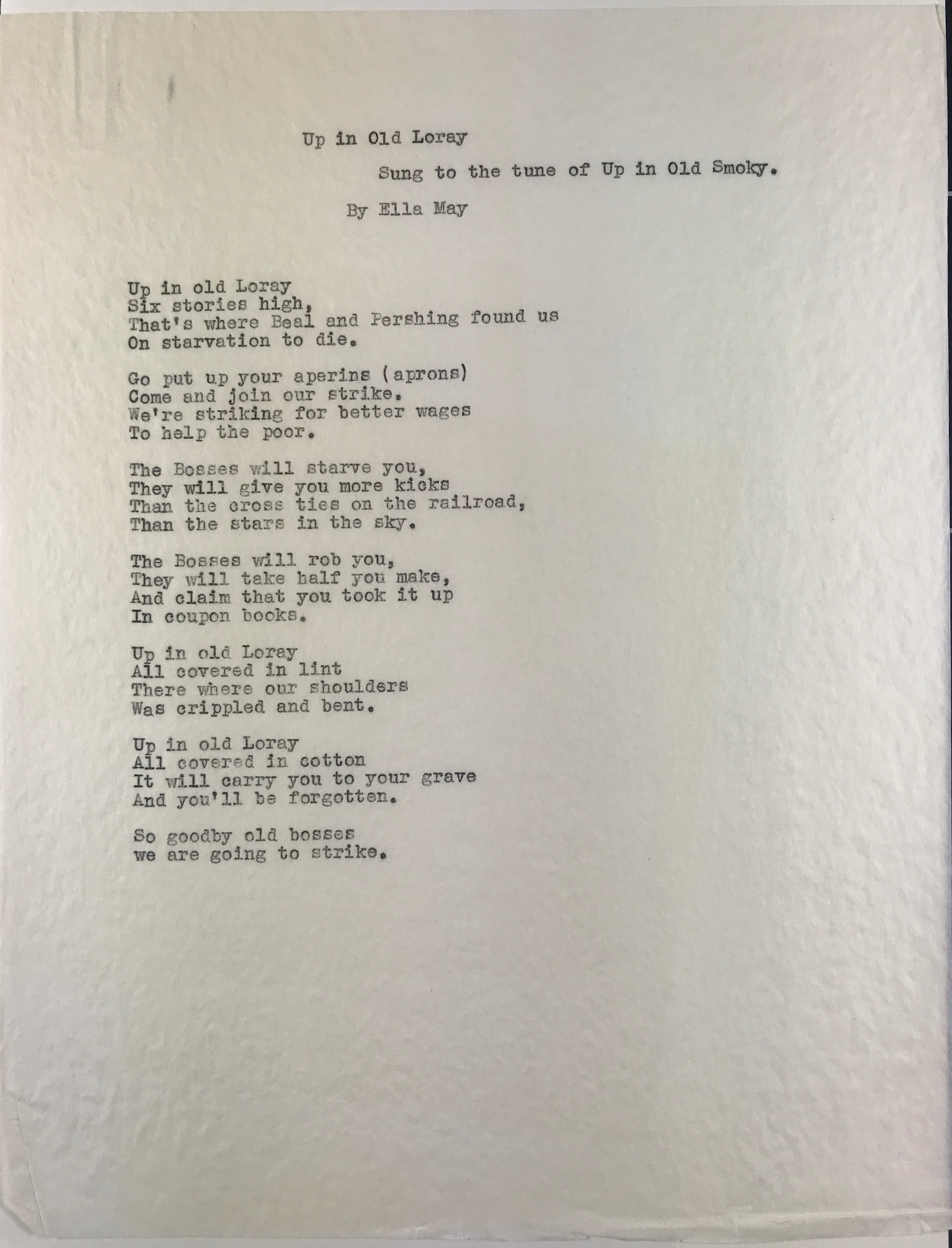
Many of the mill workers that fought for better working conditions during the strikes in 1929 will go unnamed. We are lucky to have Ella May’s songs as a reminder of her spirit and tenacity.
If you are looking to learn even more about Ella May Wiggins, check out The Southern Historical Collection’s oral histories of Ella May’s daughters, Millie Wiggins Wandell and Charlotte Wiggins. These tapes were digitized and are streaming online thanks to our generous grant from the Andrew W. Mellon Foundation.
Cox, Annette. “The Saga of Ella May Wiggins.” Southern Cultures, The University of North Carolina Press, 4 Oct. 2015, muse.jhu.edu/article/594509. Web. 7 June 2019.
Huber, Patrick. “Mill Mother’s Lament: Ella May Wiggins and the Gastonia Textile Strike of 1929.”Southern Cultures, vol. 15, no. 3, 2009, pp. 81-110. Web. 7 June 2019.
Jones, Loyal. “On the Death of Union Organizer and Balladeer Ella May Wiggins, A Tale of Two Families.” Review of Book. Appalachian Journal, vol. 43, no. 3-4, 2016, pp. 252–262. Web. 7 June 2019.
McShane, Chuck. “Tar Heel History: The Loray Mill Strike.” Our State Magazine, 17 May 2015, www.ourstate.com/loray-mill-strike/. Web 7 June 2019.
Tag: mellon foundation
Preservation Update – new hires and online recordings
Our efforts to expand and improve on audiovisual preservation continue here in Wilson Library, with the recent hiring of our third Audio Engineer, Dan Hockstein, and two Audiovisual Archives Assistants, Mel Meents and Andrew Crook. These positions have been funded by the Andrew W. Mellon Foundation as part of our Extending the Reach of Southern Audiovisual Sources: Expansion grant. This phase of the project scales the digitization and preservation work we’ve done for the SFC to all of Wilson Special Collections AV.
Andrew, Mel and I have recently moved into a new space in Wilson Library’s Digital Production Center, and we now have an official AV Lab to call our own in addition to the Ben Jones and John M. Rivers Jr. audio studios. Mel and Andrew have stayed busy working across collections in the building, producing item-level descriptions for videotapes in the University Archives’ Student Television at the University of North Carolina at Chapel Hill collection (#40326), prepping films for cool storage from the Florentine Films Archives (#20193), and managing monthly pre and post-digitization tasks.
Audio and video equipment in our new AV lab location
The audio engineers have been running tapes and discs, covering large sections of the Bruce Bastin Collection (#20428), Paul Brown Collection (#20382), William R. Ferris Collection (#20367), Apollo Records Collection (#20539-z), and North American Traditions Collection (#20503) among many others. Since August we have digitized, preserved, and provided online streaming to over 1,300 audio recordings.
A batch of 1/4" audiotapes waiting digitization
Our Technical Services department has also been working hard to decrease the number of collections in the SFC backlog, creating collection level finding aids for over 70 collections! Our AV Archivist Anne Wells and processing assistants, Rae Hoyle and Emma Evans, have completed or provided additions to a number of SFC finding aids, including the Berea College Collection of John Lair and Lester McFarland Recordings (#20281), Nancy Hamilton Collection on Molly Sequoia (#20125-z), and North Carolina Symphony Recordings (#20390-z).
Our photo stand for photographing items in the collection
In early 2019 we look forward to sending off our next batch of video priorities for digitization to our vendor. These items will be joined by recordings from a few of the regional institutions we have partnered with as part of an initiative in the grant to provide services to external collections, including Appalachian State University and North Carolina State Archives. More on that soon!
Sprout Wings and Fly turns 35
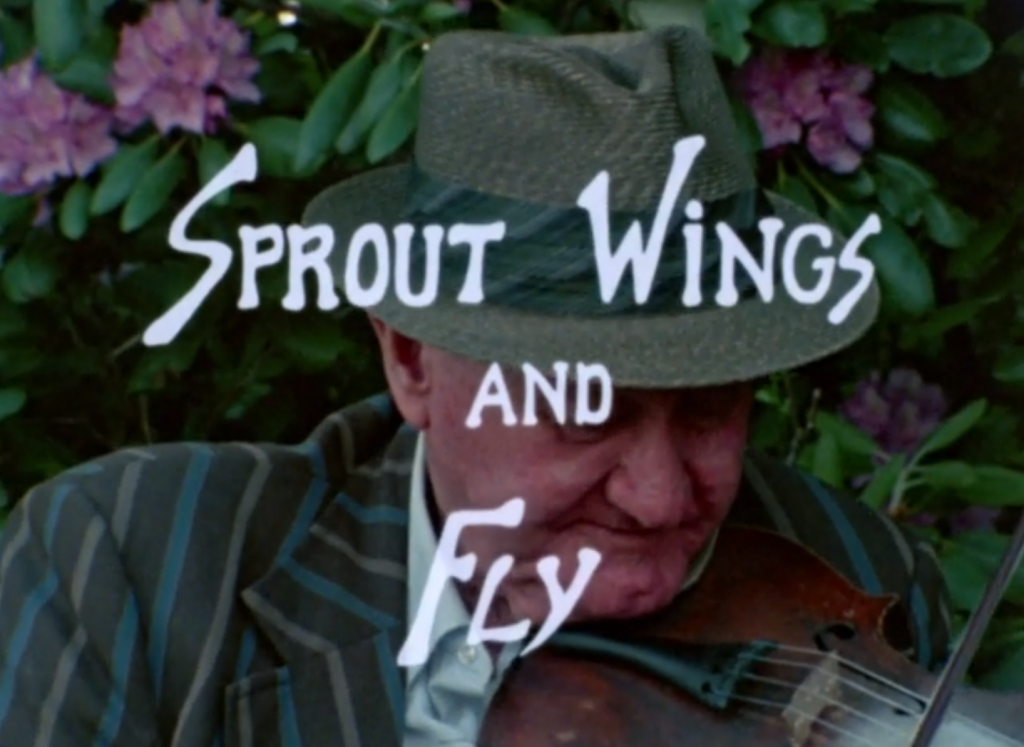
Sprout Wings and Fly, a short documentary film about the life of old-time fiddler and banjo player, Tommy Jarrell, turns 35 this fall. To celebrate this coral milestone, we’ve gathered related materials found across the Alice Gerrard Collection (#20006) to share with you all.
In August 1977, Alice Gerrard approached Tommy Jarrell about her, Cece Conway, and Les Blank making a film about him. In a letter to Tommy, Alice wrote:
“We would like to make a short film about you and your music…we would like to make the movie with a man named Les Blank who has made 6 or 8 other films about musicians. He would do all the camera work and Cece and you and I would decide what goes in the movie.”
Tommy Jarrell’s response to Alice a month later:
“I have decided I will help you all make the movie if there is no commercial TV. You know how I feel about commercial TV. They will have to set the money bags down to me if they want a commercial TV…I am looking forward to seeing you all soon. Come on down as soon as you can and we will talk a lot, fiddle some, drink a little, have a hell of a good time.”
After securing funding from the National Endowment for the Arts, North Carolina Arts Council, and the English and Folklore Departments at the University of North Carolina at Chapel Hill, the Sprout Wings and Fly production team traveled to Tommy Jarrell’s home in the small unincorporated community of Toast, North Carolina, located just west of Mt. Airy in Surry County.
Like most documentary film projects, the film was a collaborative effort – directed and photographed by Les Blank, produced and co-directed by Alice Gerrard and Cece Conway, edited by Maureen Gosling, and sound by Mike Seeger. And let’s not forget about the contributions of those who appeared in the film: Tommy Jarrell (this one goes without saying); Tommy’s sisters, Julie Lyons, Togie McGee, Edith Hicks; Tommy’s brother, Earlie Jarrell; Tommy children, Wayne Jarrell, Ardena Moncus, and Benny Jarrell; Tommy’s friends and neighbors, including fiddlers, Robert Sykes and Art Wooten; and visiting admirers and musicians, including a brief appearance by Blanton Owen.
The film, which was originally shot and distributed on 16mm motion picture film, premiered in the fall of 1983 at the Chicago International Film Festival.
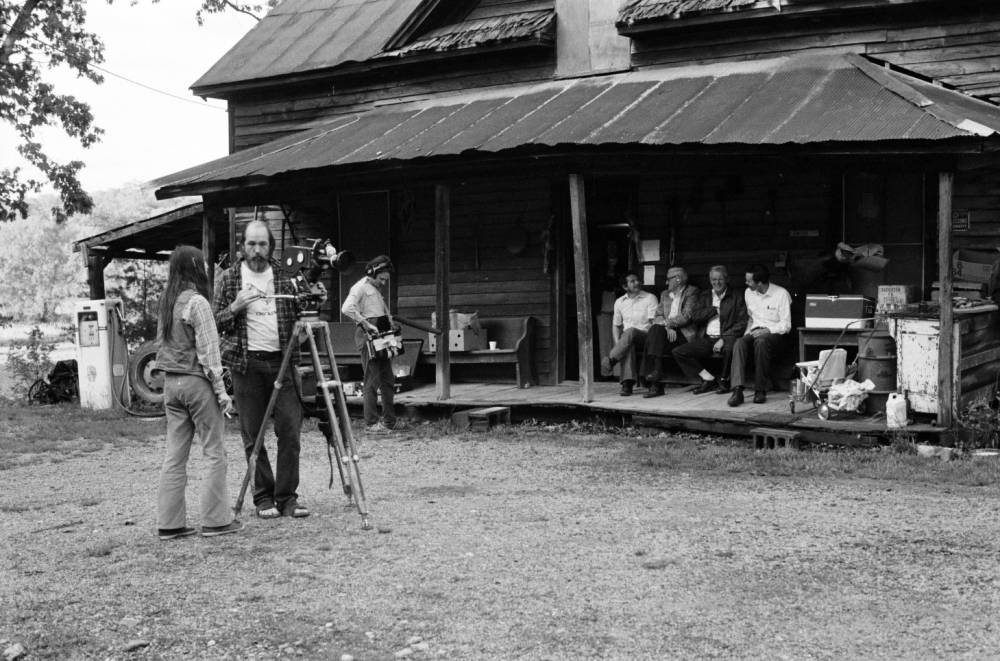
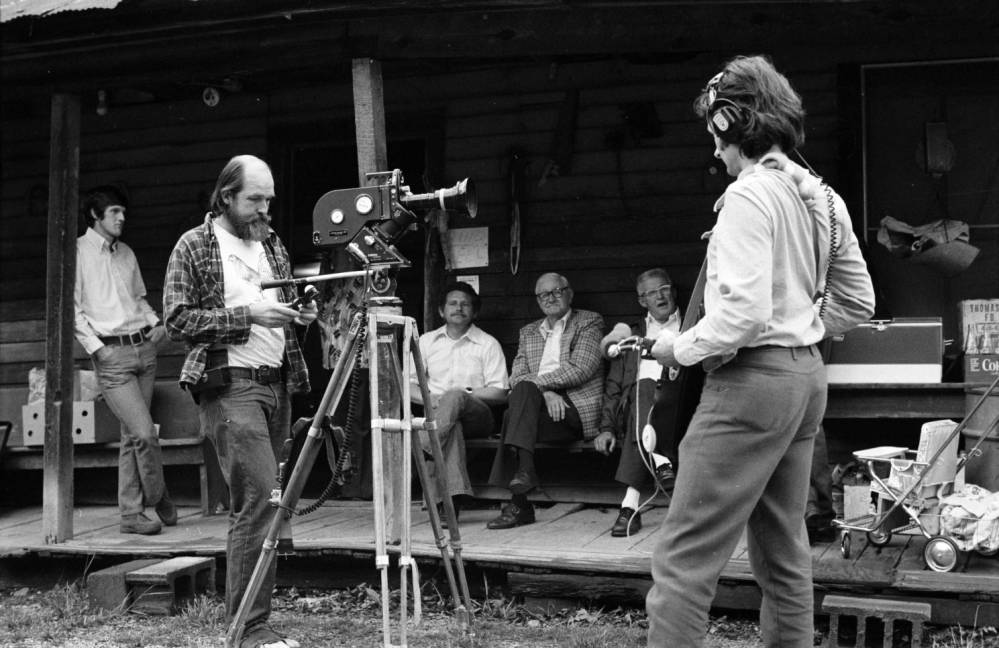
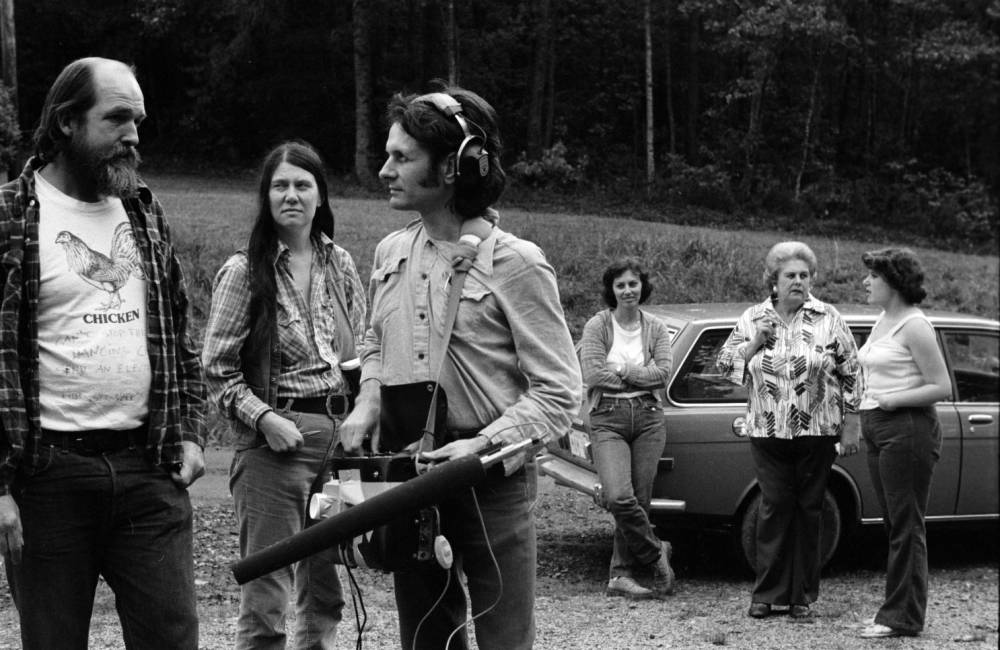
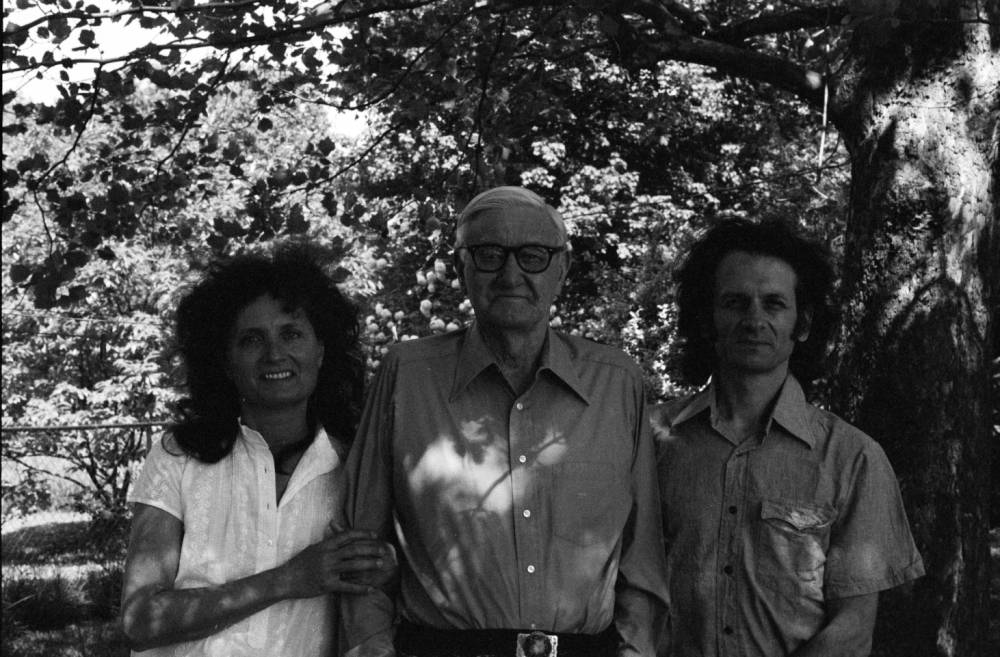
Tommy Jarrell became well known for his music late in life. Before Alice, Cece, Les, and company showed up in 1981 to begin filming (pictured above), musicians and admirers had already been taking advantage of Tommy’s open door policy to observe and learn from Tommy, who was known for his old-time clawhammer style and participating in the Round Peak music tradition of Surry County (more on Tommy and Round Peak music over on NCpedia).
One of the many admirers who reached out to Tommy for lessons included Alice Gerrard, who received this handwritten note from Tommy.
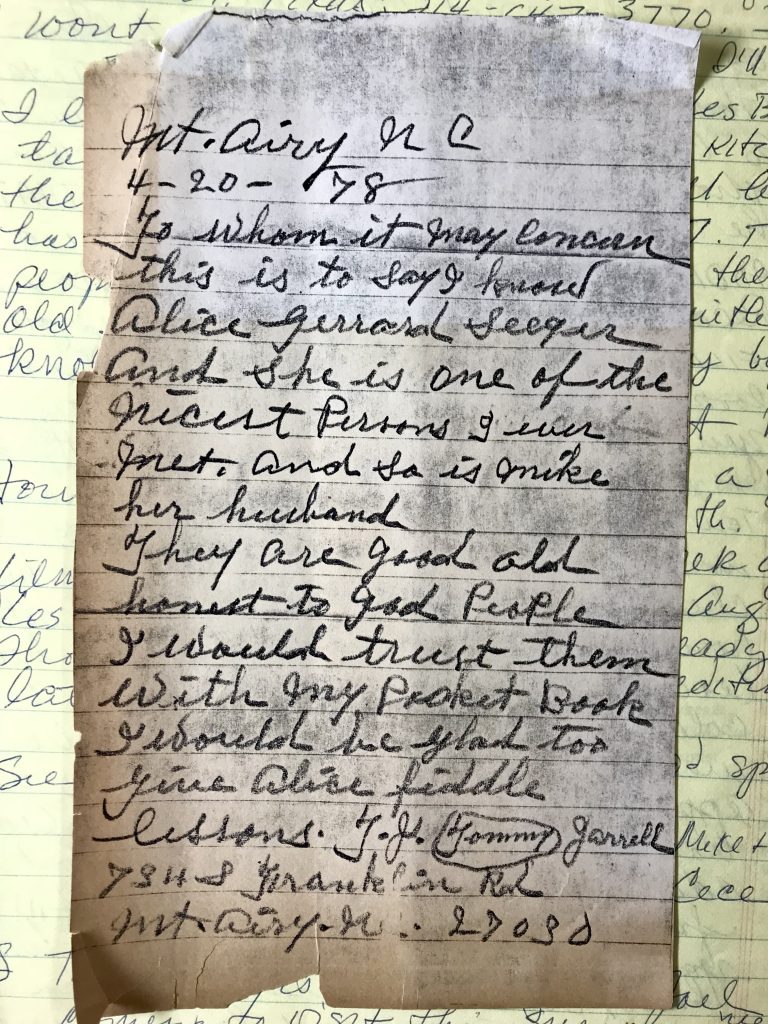
As mentioned and exhibited above, the Alice Gerrard Collection (#20006) contains a wide range of materials relating to the pre-production, production, and screening of Sprout Wings and Fly, including photographs, scrapbook clippings and ephemera, and two audio recordings.
Much of the scrapbook materials and both of the audio recordings relate to the film’s November 1984 screening at the Andy Griffith Playhouse in Mt. Airy. As the poster and ticket stub below announce, this was not just your typical film screening. It was also a stage show!
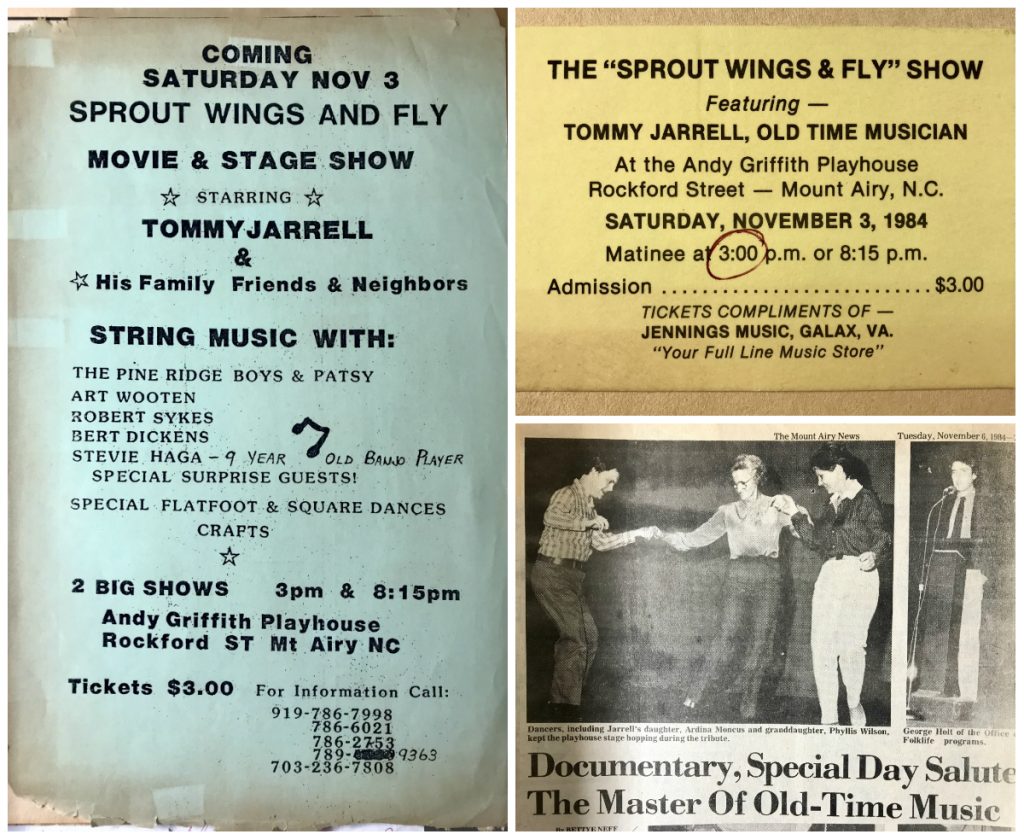
The two audio cassette recordings (FS-8685 and FS-8686, pictured below) document the stage show portion of the event, which included musical performances by Tommy himself, as well as The Pine Ridge Boys, Art Wooten, Robert Sykes, Bert Dickens (aka Bertie Dickens), Steve Haga (only 9 years old!), Mike Seeger, and Tommy’s sister, Julie Lyons, among others.
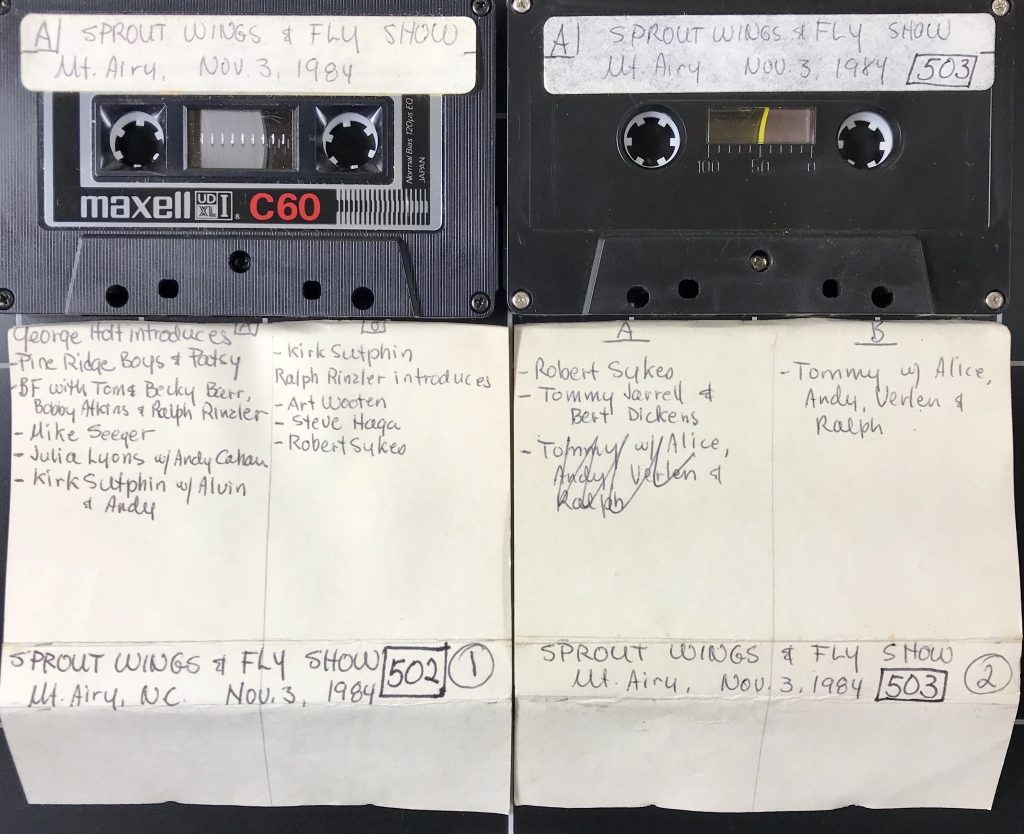
Both recordings are streaming in full on the Alice Gerrard Collection #20006 finding aid, thanks to an ongoing grant from the Andrew W. Mellon Foundation. Below is a sampling of some of our favorites performances…enjoy!
Julie Lyons, “Wildwood Flower” (FS-8685, side 1, 23:35-24:44)
Mike Seeger: A woman that a lot of you know and that we worked with in the film, Tommy's sister, Julie Lyons, I believe is going to sing a song for you. Julie. Excuse me folks she's going to play the harp [harmonica] for you. Why don't you give her a nice, warm welcome.
[applause]
♪"Wildwood Flower" [instrumental]
Steve Haga, “Shuckin‘ the Corn” (FS-8685, side 2, 22:58-24:55)
Steve Haga: I'm going to play a little [?], "Shuckin' the Corn"
[applause]
♪"Shuckin' the Corn" [instrumental]
Steve Haga: Thank you!
Robert Sykes and the Surry County Boys, “Black-eyed Susie” (FS-8685, side 2, 25:25–28:53)
Alice Gerrard: I'd like to introduce the next band. Robert Sykes has been a member of this community for a real long time. He used to be a fiddle player. I have an old picture of Robert when he played with his brother, playing fiddle and guitar. He quit for a long time and nobody ever thought he played the fiddle, or at least we didn't know. He was in the movie, just briefly at the dance, as a dancer. We didn't know he ever played the fiddle, although Tommy said he used to play the fiddle. Well a little bit later, he started picking it up again, and I believe it a lot of the reason he took the fiddle back up was due to Tommy's encouragement to go ahead and try to get back into playing again. And he certainly has. He's been going like a house of fire ever since. And I'd like you to make welcome to Robert Sykes and the Surry County Boys.
[applause]
Robert Sykes: We're going to try one called "Black-eyed Susie"
♪"Blackeyed Susie" [instrumental]
Robert Sykes: Our next tune is a tune that I made up. I was mowing the yard one day and a tune kept coming over my mind and I killed the motor on the lawn mower and went into the house and played it. I live about a quarter of a mile from Tommy Jarrell and I went up there and "Tommy, I got a need a tune. I'll play it. If you don't like it, tell me. And if you do, name it." And I played it for him and he said, "I'll call that 'Robert Surly[?].'" He didn't say he didn't like it.
Tommy Jarrell, “June Apple” (FS-8686, side 1, 00:00-04:40)
Tommy Jarrell: Does that sound right? I'm going to try and sing a little a "June Apple", I don't guess I'll get the job done, but I'll try it.
♪"June Apple"
Wish I was a june apple
Hanging on a tree
Every time my true love pass
Take a big bite of me.
Can't you hear that banjo sing
I wish that gal was mine
Don't you hear that banjo sing
I wish that gal was mine.
I'm going 'cross the mountain
I'm going in my swing
It's when I get on the other side
I'm going to get my woman sing.
Charlie he's a nice young man
Charlie he's a dandy
Charlie is a nice young man
Feeds the girls on candy.
Goin down to the river to feed my sheep
Going down to the river Charlie
Going down to the river to feed my sheep
Feed them on Barley.
I wish I had a [?]
'Cuz every time it rains and snows
It's sun down on my fire.
Tommy Jarrell: Thank you
[applause]
Tommy Jarrell, “Big Eyed Rabbit” (FS-8686, side 1, 09:50-12:57)
Andy Cahan: we got a request for "Big Eyed Rabbit"
Tommy Jarrell: "Big Eyed Rabbit". Alright, here we go...I don't believe I can think of it.
♪ "Big Eyed Rabbit" Yonder comes a rabbit, Down skipping through the sand Shoot that rabbit, He don't mind Fry him in my pan Lord I fry him in my pan. Yonder comes a rabbit, Just as hard as he can run It's yonder comes another one Gonna shoot him with a double barrel gun, Shoot him with a double barrel gun. Rocking in a weary land, I'm rocking in a weary land. Yonder comes my darling, It's how do you know? I know her by her pretty blue eyes Shining bright like gold, Shining bright like gold.
[applause]
Tommy Jarrell: I'm sorry about that singing. I just couldn't get up there. One more?
We invite you to continue exploring materials found in the Alice Gerrard Collection (#20006) related to the production. And if you’re interested in viewing Sprout Wings and Fly over the long holiday weekend (highly recommended, of course!), it is available on DVD via Criterion Collection and as of November 2018, the film is streaming on Kanopy, a streaming service that is available for free to all UNC staff and students.
Field recordings and Folklife
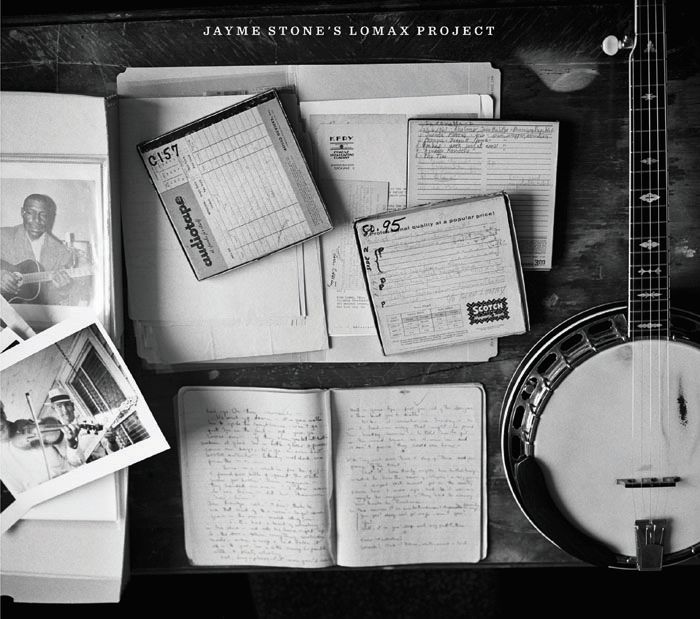
Our friends at The ArtsCenter in Carrboro are hosting banjo musician Jayme Stone and his Folklife Project on Friday, April 27. Continuing the practice from 2014’s Lomax Project, CD-15287 in the Southern Folklife Collection, Stone and his collaborators continue to look to recordings made by folklorists and field recorders for songs to reimagine. While Alan Lomax made recordings across the globe, opening up the source material allows for Stone to explore the work of other folklorists and song collectors, presenting that work to new listeners.
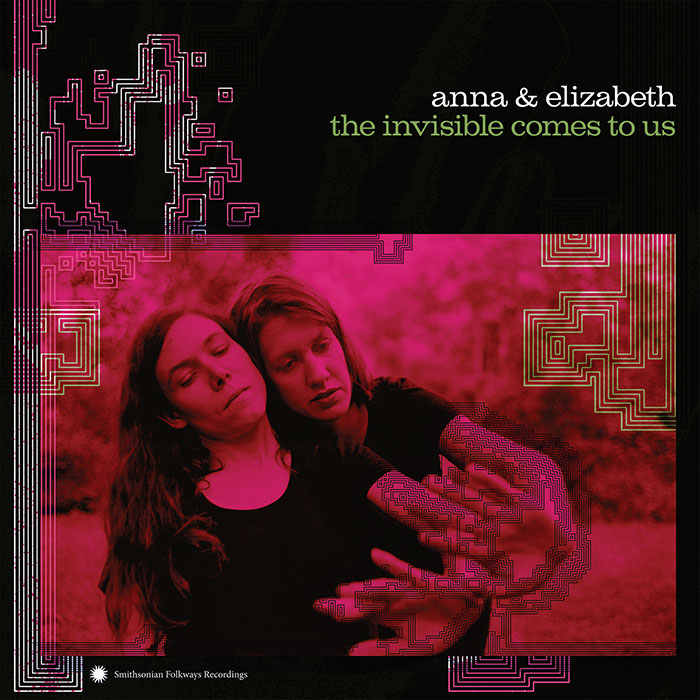 The Smithsonian Folkways recording artists Anna & Elizabeth have also looked to archival recordings for source material, and during a recent performance at Chapel Hill’s Nightlight, the duo performed along with a field recording of Margaret Shipman singing “Jeanno and Jeanette” recorded by Helen Hartness Flanders, a folklorist from Vermont whose collection is at Middlebury College Davis Family Library. The Flanders collection is digitized and you can hear her recordings of Margaret Shipman streaming online via the Internet Archive
The Smithsonian Folkways recording artists Anna & Elizabeth have also looked to archival recordings for source material, and during a recent performance at Chapel Hill’s Nightlight, the duo performed along with a field recording of Margaret Shipman singing “Jeanno and Jeanette” recorded by Helen Hartness Flanders, a folklorist from Vermont whose collection is at Middlebury College Davis Family Library. The Flanders collection is digitized and you can hear her recordings of Margaret Shipman streaming online via the Internet Archive
The Southern Folklife Collection is the repository for thousands of field recordings and many of these stream online thanks to the Audiovisual Preservation and Access Team and grant support from the Andrew W. Mellon Foundation. I hope these recordings can inspire artists to create new and reassembled works as well. Remember that Wilson Library does offer fellowships!
There are well over 20,000 streaming audio recordings streaming online through the Southern Folklife Collection finding aids. Field recordings are made in the field, taking the listener to a specific time and place. With that in mind I selected a few recordings made in North Carolina. Be sure you click through to the streaming file to listen.
- For some old time inspiration, the Paul Brown Collection (20382) includes many recordings made at the home of fiddler Benton Flippen. Audio cassette FS-6582 was recorded 22 October 1980 along with Paul Brown and Paul Sutphin.
- For some blues, the Joan Fenton Collection (20382) includes open reel tape recordings she made of Howard Cotten, bluesman and storyteller from Goldston, NC. Audiotape FT-0891 was made 6 August 1976 and includes Mr. Cotten performing the Piedmont blues classic “Step it Up and Go” as well as sharing memories about Blind Boy Fuller.
- Field recordings in the Artus Moser Papers (20005) were made on instantaneous discs. Listening through some of those recordings recently, I fixed on disc FD-0705. Songs on the recording, including a driving and lightly swinging version of “John Henry.” are performed by an unidentified female singer, recorded to instantaneous disc by Artus Moser in the 1930s.
If you are interested in other field recordings in the Southern Folklife Collection and Wilson Library, contact us anytime! And remember you can hear Jayme Stone’s Folklife interpret field recordings at The ArtsCenter this Friday.
Martin Luther King, Jr. speaking from Birmingham, 1963
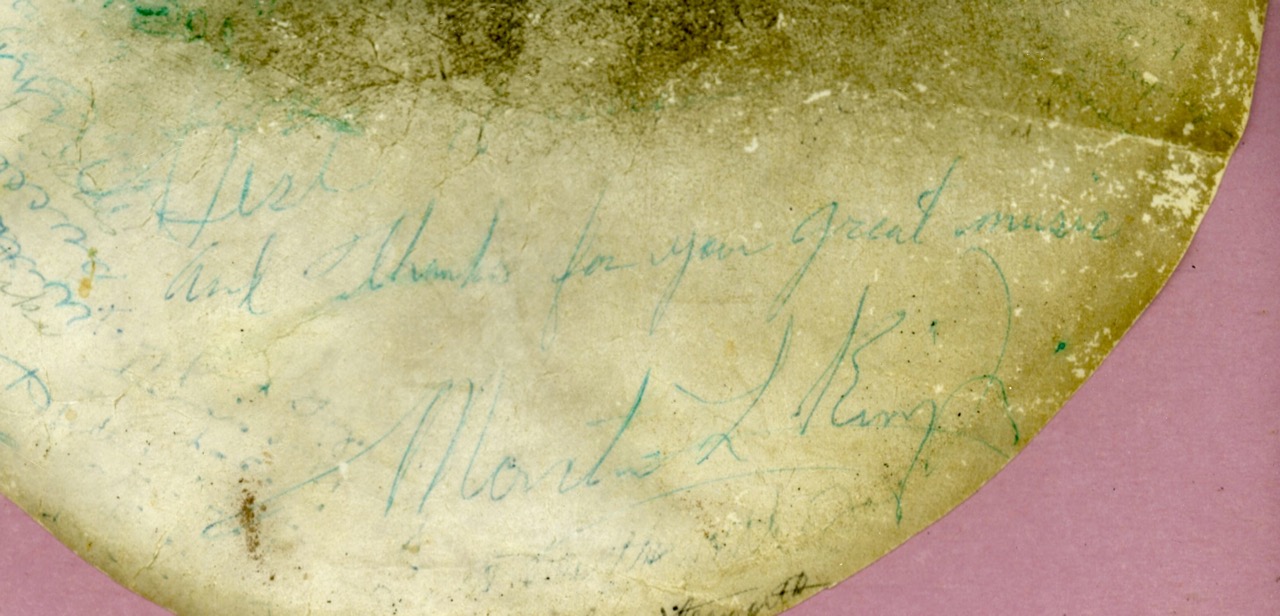 Like many of you today, we remember Dr. Martin Luther King, Jr. and his legacy by turning to his own voice and words. In that spirit we’d like to share a clip of a speech Dr. King made to a group of organizers and activists at a Mass Meeting in Birmingham, Alabama, April 1963, digitized from open reel tape recording FT-20008/9832 in the Guy and Candie Carawan Collection (20008). He addresses the audience with seriousness and humor, inspiring them to continue to fight for the cause and lifting them up in solidarity before they all join together to sing “We Shall Overcome”. Listen to those clips here or read the transcription below:
Like many of you today, we remember Dr. Martin Luther King, Jr. and his legacy by turning to his own voice and words. In that spirit we’d like to share a clip of a speech Dr. King made to a group of organizers and activists at a Mass Meeting in Birmingham, Alabama, April 1963, digitized from open reel tape recording FT-20008/9832 in the Guy and Candie Carawan Collection (20008). He addresses the audience with seriousness and humor, inspiring them to continue to fight for the cause and lifting them up in solidarity before they all join together to sing “We Shall Overcome”. Listen to those clips here or read the transcription below:
[Speaking: Rev. Charles Billups]:
Now let us join hands and let us sing together, “We Shall Overcome”
[singing]
We shall overcome
We shall overcome
We shall overcome someday,
Oh deep in my heart
I do believe
We shall overcome someday.
You can hear the entire tape, as well as interviews and comments from participating student actives, streaming through the Southern Folklife Collections digital collections here: FT-20008/9832. Digitized recordings in the Guy and Candie Carawan Collection have been made accessible through streaming thanks to SFC’s ongoing audiovisual preservation grant from the Andrew W. Mellon Foundation.
The photo above is a closeup of Guy Carawan’s banjo head (pictured in full below), signed by Martin Luther King, Jr. as well as other leaders like Rosa Parks, Mahalia Jackson, Septima Clark, Fred Shuttlesworth and more. If you are interested in other archival materials related to Martin Luther King, Jr. you may want to read an article from today’s News and Observer, April 4, 2018, “Martin Luther King, Jr. and Chapel Hill’s Jim Crow Past,” by journalist Mike Ongle. The article based on research across the collections at Wilson Special Collections Library and details Martin Luther King’s visit to Chapel Hill and UNC Chapel Hill in May of 1960, including photos from the John Kenyon Chapman Papers (05441) .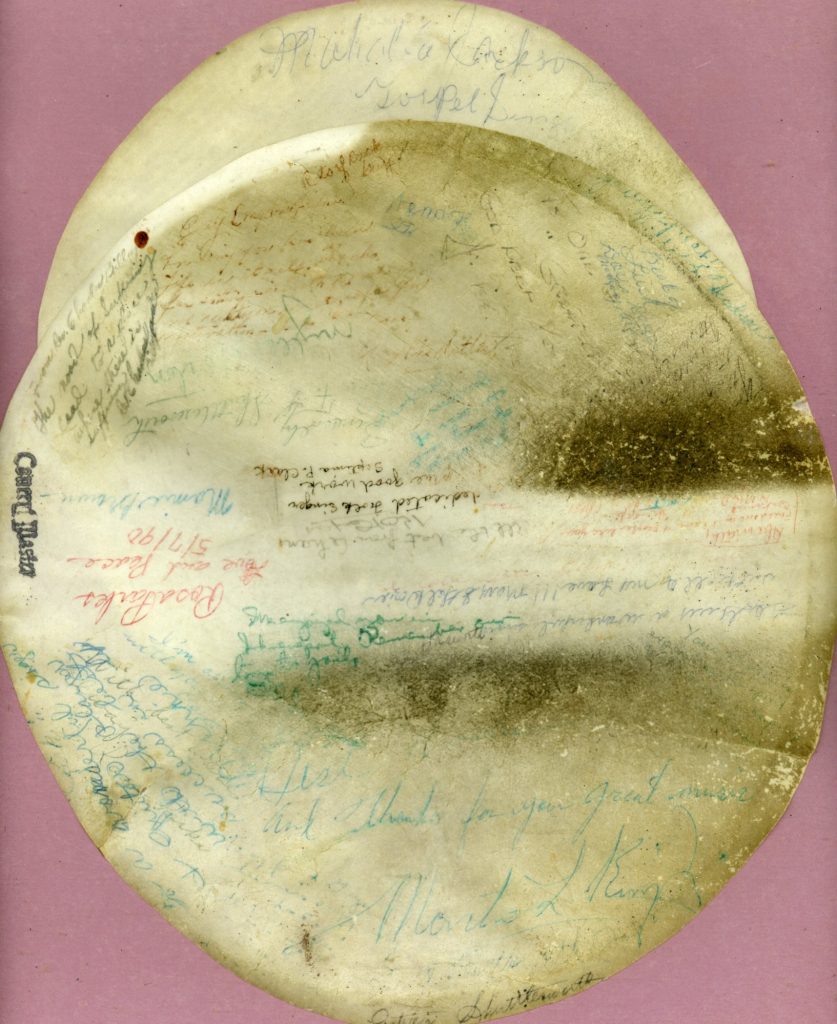
Now Available for Research: Joan Moser Collection
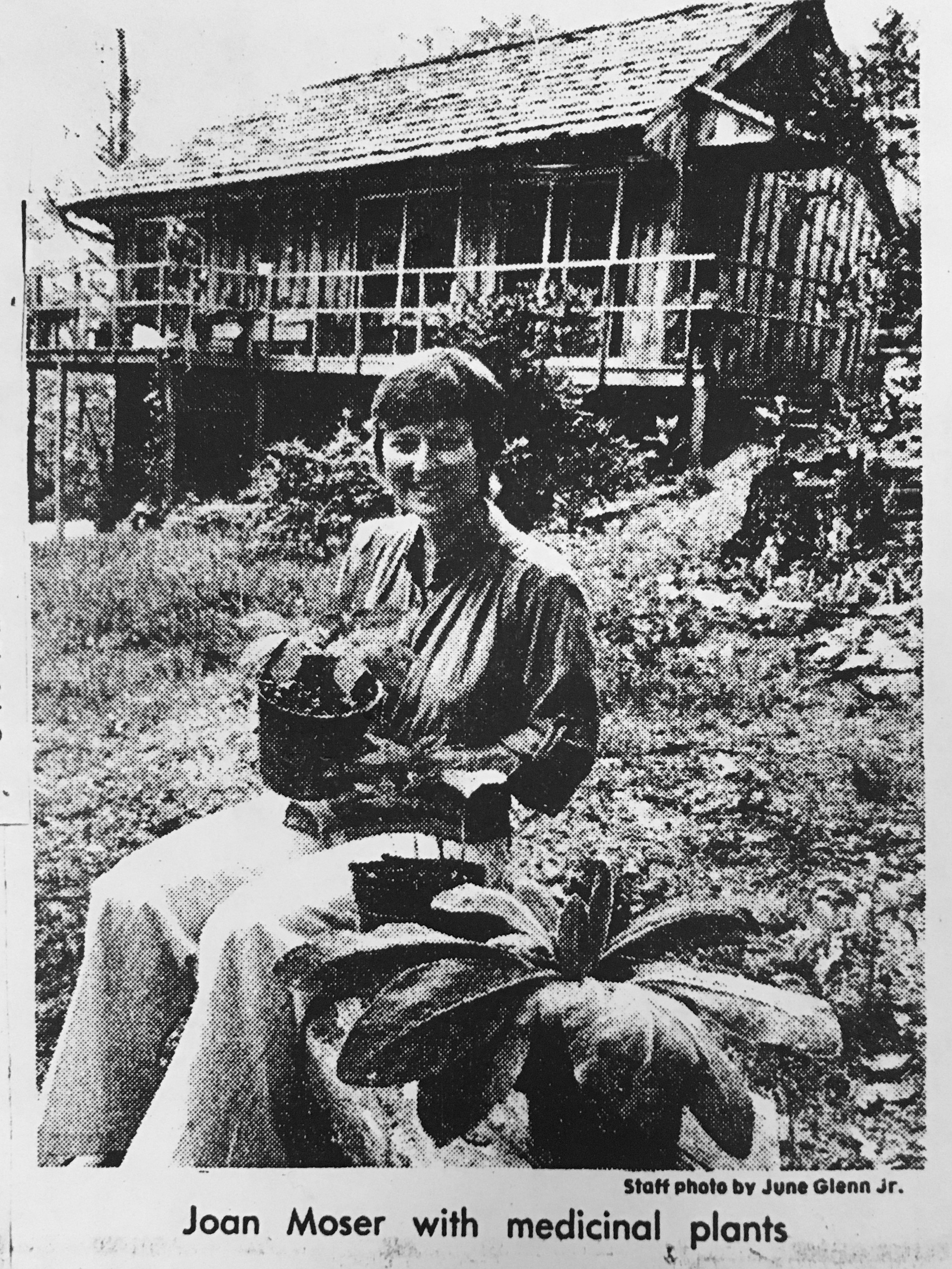
We recently published a finding aid for the Joan Moser Collection (20370), which contains the papers and audiovisual materials of the western North Carolina based folk musician and historian, Joan Moser. There’s a chance you may have heard of Joan’s father, Artus Moser, whose collection of papers also resides at the Southern Folklife Collection. Like her father, Joan studied and taught the music and folk traditions of Appalachia. She also played – guitar, banjo, lute, and dulcimer, to name a few.
Joan’s collection is made up mostly of open reel tapes that she compiled over the years. Thanks to SFC’s ongoing audiovisual preservation grant from the Andrew W. Mellon Foundation, the Joan Moser Collection is now available for research and her tapes have been queued up for digitization.
Many of the tapes found in her collection have close ties to the music and traditions of western North Carolina. Below is a visual sampling of these tapes, including live recordings from the Asheville Mountain Dance and Folk Festival and recordings made at the Moser family home in Swannanoa, N.C., located on Buckeye Cove in Buncombe County.
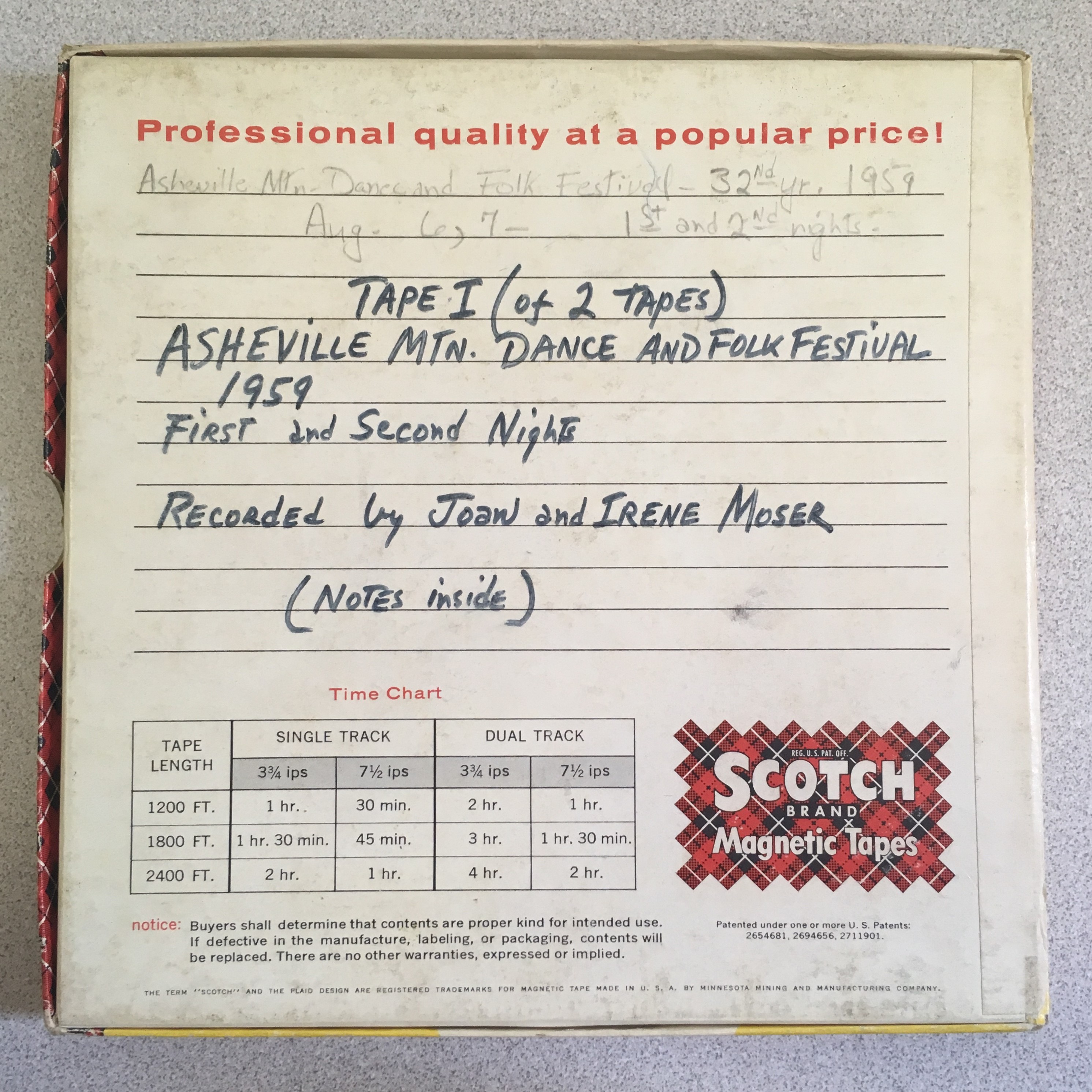
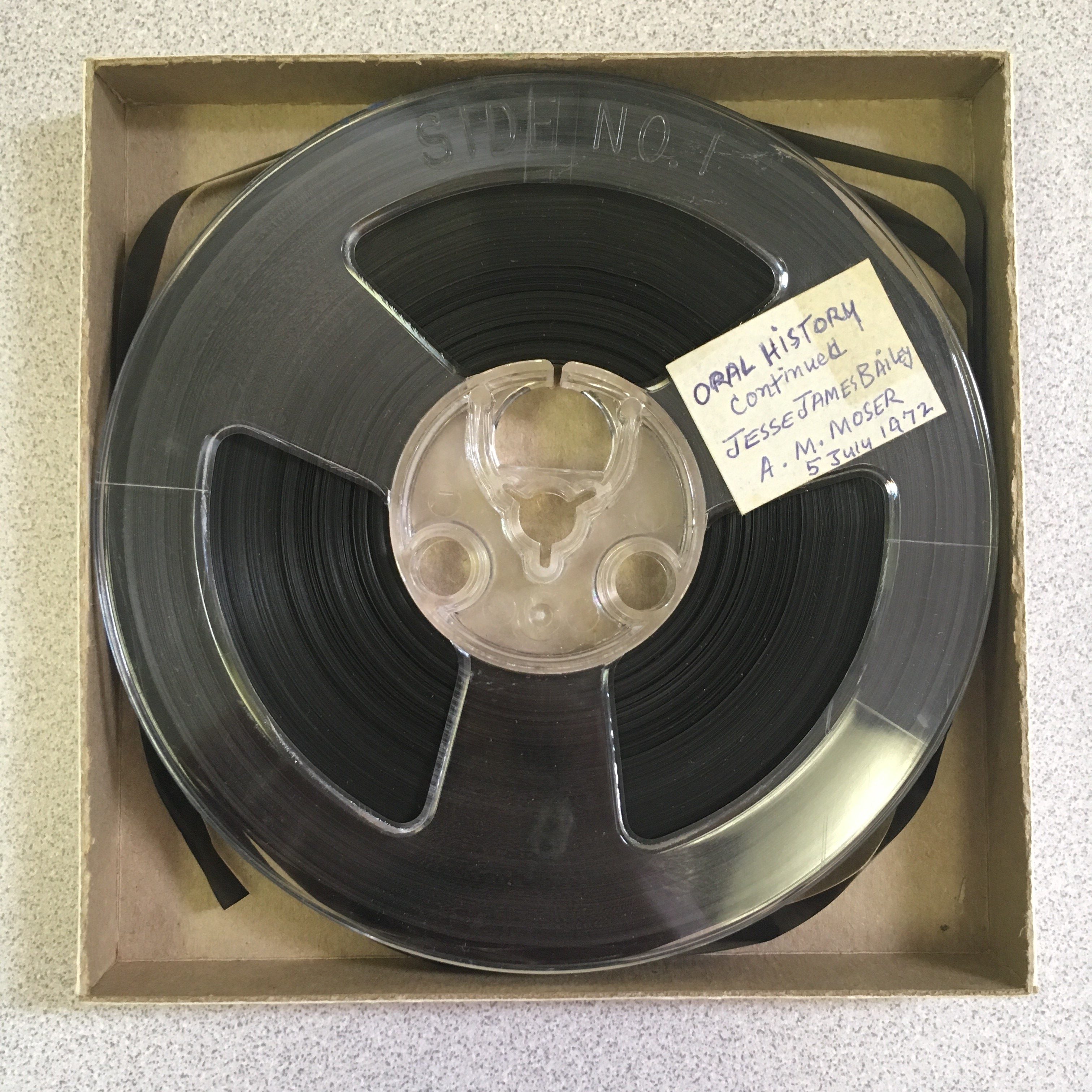
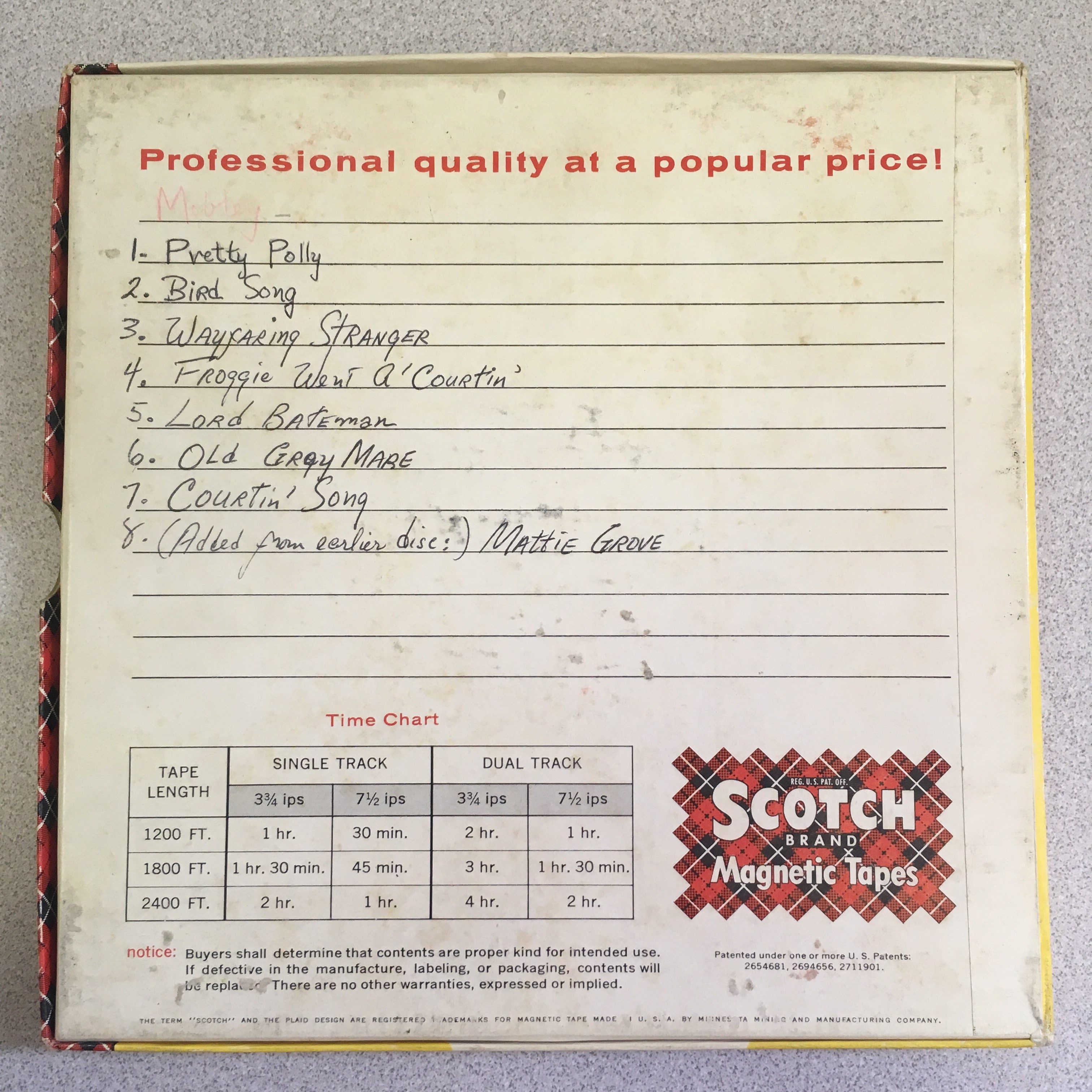
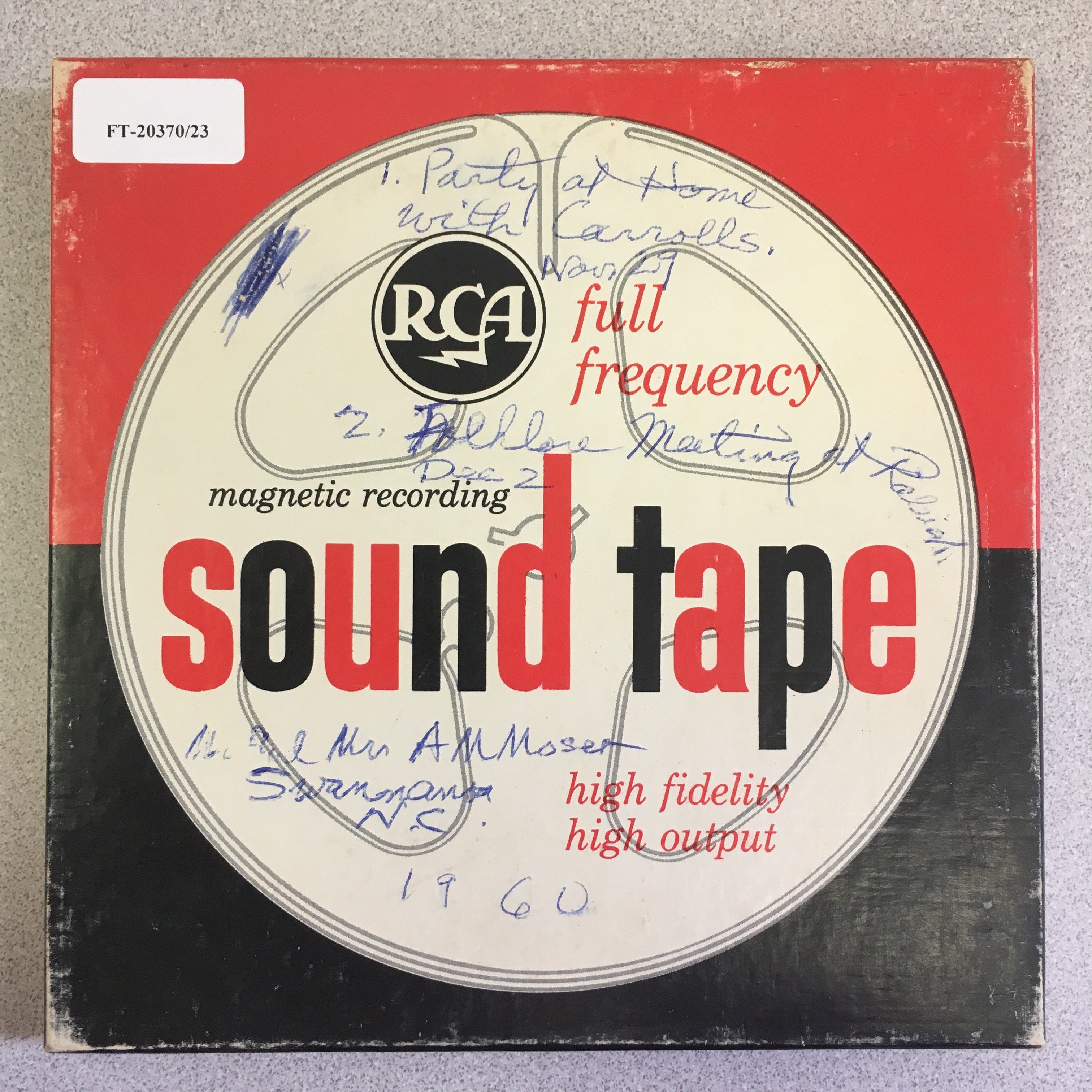
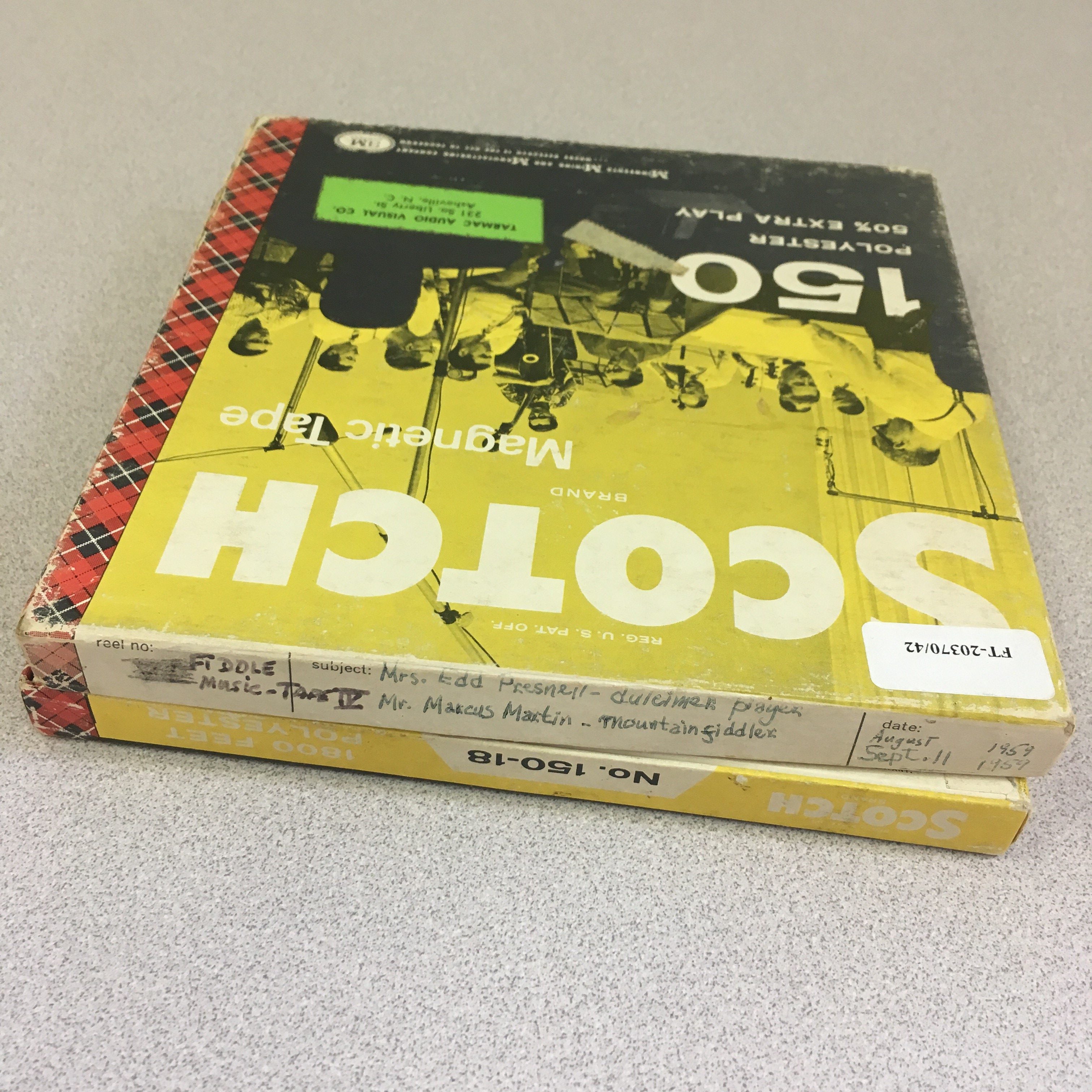
SFC videos of the week: Bertie Dickens and Enoch Rutherford
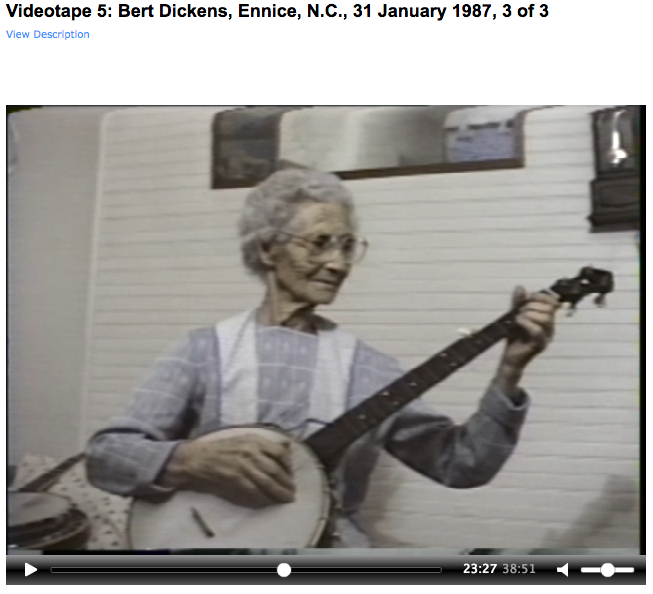
You read the title correctly, “SFC videos of the week.” We have been slowly rolling out streaming archival videos held in the Southern Folklife Collection, but now there are just too many not to share widely. These first two videos, Videotape VT-20113/5 featuring Bert Dickens (above) and Videotape VT-20113/8 Enoch Rutherford (below) are part of the Nancy Kalow Collection (20113). To go directly to the streaming video click on the images in this post or visit the finding aid for the finding aid for the Nancy Kalow Collection (20113) here.
The Nancy Kalow Collecion collection comprises 29 videotapes of various aspects of North Carolina folklife recorded by Kalow between 1987 and 1991. These two tapes, Videotape VT-20113/5 are part of a series documenting traditional North Carolina musicians that Kalow made in association with musician and founder of The Old-Time Herald Alice Gerrard as part of a project for the North Carolina Arts Council. Originally recorded on Hi-8 video, digitization and streaming of these videos and others is made possible through support from a grant from the Andrew W. Mellon Foundation.
Old-time banjo player and North Carolina Heritage Award recipient, Bertie (Bert) Caudill Dickens spent most of her life the community of Ennice in Alleghany County, North Carolina. The video was recorded in her home on Jan 31, 1987.
Recordings of Enoch Rutherford were also made on January 31, 1987 at his home in Independence, Virginia (for an excellent article on Enoch Rutherford, see this remembrance written by musician Martha Spencer in 2013 from Mountain Music Magazine). Accompanied by Alice Gerrard and Andy Cahan, Rutherford’s hard-driving clawhammer style is in full force. The versions of “Sugar Hill” and “Whoa, Mule” on this tape are spectacular (as noted by an enthusiastic audience member off camera hollering support). 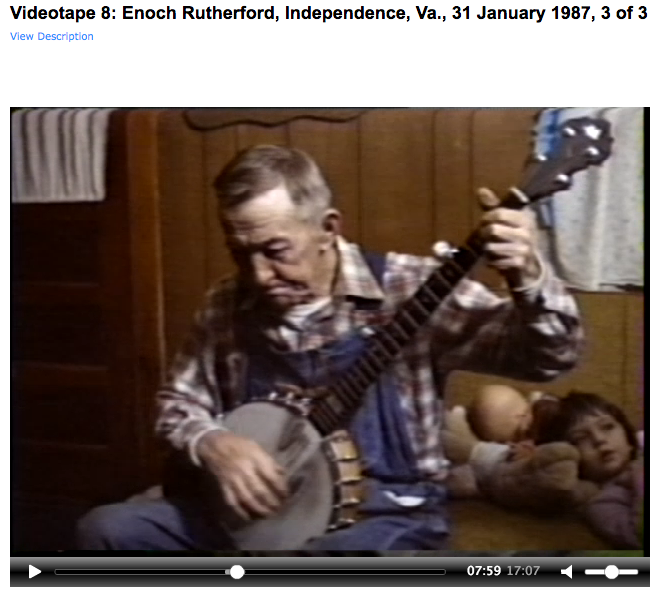
Other musicians documented in the collection include Thomas Burt, Calvin Cole, Walter Raleigh Babson, Joe and Odell Thompson, Piedmont blues musicians George Higgs and James Bud Powell, and John Rector. There are also tapes documenting a 1987 performance at the UNC Forest Theatre by storyteller Steven Henegar and Uncle Eli’s Quilting Bee, an annual event that has taken place in Alamance County since 1931 and which Kalow recorded on 7 April 1988 at Eli Whitney Recreation Center.
Stay tuned to Field Trip South for more streaming media updates or browse our collections and finding aids through our website here.

